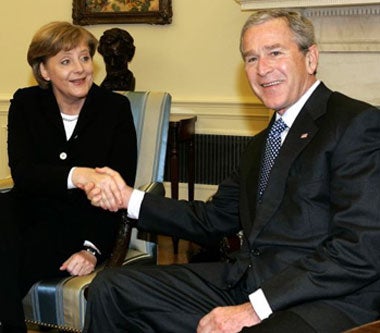Merkel adopts hardline approach to Russia

Angela Merkel, the German Chancellor, has radically altered the course of her country's foreign policy after confronting Russia's Vladimir Putin on a range of difficult issues that her predecessor had studiously avoided.
Signalling the end of a relationship that has been characterised by bonhomie for years, Ms Merkel flew into Moscow for the first time since becoming Chancellor on a routine "meet-and-greet" visit yesterday, but did not waste too much time on pleasantries.
A fluent Russian speaker, thanks to her education in what was then Communist East Germany, she tackled Mr Putin on the sensitive subject of Moscow's nuclear co-operation with Iran, on the state of Russian demo- cracy, on the behaviour of Russian forces in Chechnya, and on the reliability of Russia's enormous gas supplies.
Her forthright approach was in sharp contrast to that of her predecessor, Gerhard Schröder, who counted Mr Putin as a close personal friend, called him a "flawless democrat", and who took a highly paid job with the Russian energy giant Gazprom after he left office.
Ms Merkel has made it clear she wants to be different and did not shy from raising international concerns about a controversial new law that would strictly regulate the activities of foreign human rights organisations in Russia.
She called it an "irritation" and promised she would monitor the law's effects, prompting Mr Putin to assure her in public that the lawful activities of foreign human rights group would be unaffected.
On the subject of Chechnya and alleged human rights abuses being perpetrated by Russian forces there, Ms Merkel said that the two leaders had found "no common ground" but was nevertheless upbeat about prospects for the two countries' relations.
Ms Merkel had been under serious pressure from nearly all the parties in Germany, including her own, to adopt a more critical stance on Russia that meant distancing herself from Mr Schröder's informal relations with the Russian leader.
Critics alleged that Mr Schröder's cosy relationship with Moscow meant he remained uncritical of Russian human rights abuses while allowing Berlin's foreign policy to be dominated by Russia at the expense of eastern Europe and Washington.
German public opinion was shocked recently by Mr Schröder's decision to accept a key post with Gazprom. The ensuing row between Russia and Ukraine over gas supplies exacerbated German misgivings about the reliability of Moscow as an energy supplier. But Germany has little room for manoeuvre. Almost one- third of its gas is Russian and it is set to start importing even more, meaning that Ms Merkel will have to tread carefully when it comes to criticising Moscow.
Her decision to meet Russian citizens' rights groups, opposition MPs, and church leaders, at Germany's Moscow embassy yesterday was, however, an obvious attempt to show she viewed Russian differently from Mr Schröder.
She made it clear during her visit to Washington last week that she wanted to restore the transatlantic relationship and put an end to Russian-dominated German diplomacy.
Klaus Mangold, chairman of Germany's East-West Industry Committee, said Ms Merkel's visit was likely to bring about a key shift in Russian-German relations. "Freedom is at the centre of her political beliefs," he said. "Coming from the East, she has a different view of Russia."
Subscribe to Independent Premium to bookmark this article
Want to bookmark your favourite articles and stories to read or reference later? Start your Independent Premium subscription today.

Join our commenting forum
Join thought-provoking conversations, follow other Independent readers and see their replies